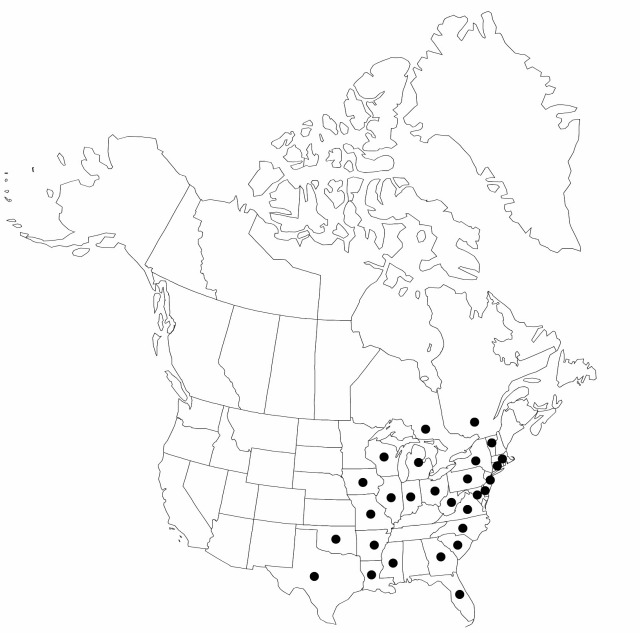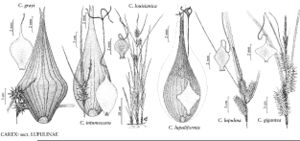Difference between revisions of "Carex lupuliformis"
Amer. J. Sci. Arts, ser. 2, 9: 29. 1850.
FNA>Volume Importer |
imported>Volume Importer |
||
| (6 intermediate revisions by 2 users not shown) | |||
| Line 8: | Line 8: | ||
}} | }} | ||
|common_names=Carex faux-lupulina | |common_names=Carex faux-lupulina | ||
| + | |special_status={{Treatment/ID/Special_status | ||
| + | |code=F | ||
| + | |label=Illustrated | ||
| + | }}{{Treatment/ID/Special_status | ||
| + | |code=E | ||
| + | |label=Endemic | ||
| + | }} | ||
|basionyms= | |basionyms= | ||
|synonyms= | |synonyms= | ||
| Line 24: | Line 31: | ||
|elevation=0–500 m | |elevation=0–500 m | ||
|distribution=Ont.;Que.;Ark.;Conn.;Del.;Fla.;Ga.;Ill.;Ind.;Iowa;La.;Md.;Mass.;Mich.;Miss.;Mo.;N.J.;N.Y.;N.C.;Ohio;Okla.;Pa.;S.C.;Tex.;Vt.;Va.;W.Va.;Wis. | |distribution=Ont.;Que.;Ark.;Conn.;Del.;Fla.;Ga.;Ill.;Ind.;Iowa;La.;Md.;Mass.;Mich.;Miss.;Mo.;N.J.;N.Y.;N.C.;Ohio;Okla.;Pa.;S.C.;Tex.;Vt.;Va.;W.Va.;Wis. | ||
| − | |discussion=<p>Carex lupuliformis is rare and local throughout much of its range, especially northward.</p> | + | |discussion=<p><i>Carex lupuliformis</i> is rare and local throughout much of its range, especially northward.</p> |
|tables= | |tables= | ||
|references= | |references= | ||
| Line 33: | Line 40: | ||
-->{{#Taxon: | -->{{#Taxon: | ||
name=Carex lupuliformis | name=Carex lupuliformis | ||
| − | |||
|authority=Sartwell ex Dewey | |authority=Sartwell ex Dewey | ||
|rank=species | |rank=species | ||
| Line 47: | Line 53: | ||
|publication title=Amer. J. Sci. Arts, ser. | |publication title=Amer. J. Sci. Arts, ser. | ||
|publication year=1850 | |publication year=1850 | ||
| − | |special status= | + | |special status=Illustrated;Endemic |
| − | |source xml=https:// | + | |source xml=https://bitbucket.org/aafc-mbb/fna-data-curation/src/2e0870ddd59836b60bcf96646a41e87ea5a5943a/coarse_grained_fna_xml/V23/V23_958.xml |
|genus=Carex | |genus=Carex | ||
|section=Carex sect. Lupulinae | |section=Carex sect. Lupulinae | ||
Latest revision as of 20:44, 5 November 2020
Plants loosely cespitose or not, long-rhizomatous. Culms solitary or not, erect, 50–130 cm. Leaves 4–7; basal sheaths brownish; sheath of distal leaf 3–21 cm; ligules rounded to triangular, 6–28 mm; blades 30–80 cm × 6–13 mm. Inflorescences 6–40 cm; peduncles of proximal spikes 1–13 cm, basal 2 peduncles 2–17 cm apart; of terminal spikes 1–12 cm, shorter than to somewhat exceeding the distal pistillate spike; bracts leafy, sheath 1–9 cm; blades 20–70 cm × 4–11 mm. Spikes: proximal pistillate spikes 2–6, the distal usually ± crowded, ascending, densely 8–90-flowered, usually cylindric, 2–8 × 1.5–3 cm; terminal staminate spikes 1–2, 2–10 cm × 2–5 mm. Pistillate scales 3–9 veined, lanceolate, 6–13 × 1.8–3.2 mm, apex acute to awned, awn rough, to 5.5 mm. Anthers 3, 3.5–7 mm. Perigynia ascending to spreading, strongly 17–25-veined, sessile, lance-ovoid, 12–18.5 × 3.8–6 mm, shiny, glabrous; beak conic, 6–9 mm. Achenes stipitate, rhombic, concave faces, angles thickened, prominently knobbed with hard, nipplelike points, 3–4.5 × (2.2–)2.4–3.4 mm; style same texture as achene.
Phenology: Fruiting late spring–summer.
Habitat: Wet forests, especially in openings around forest ponds, riverine wetlands, marshes, wet thickets
Elevation: 0–500 m
Distribution

Ont., Que., Ark., Conn., Del., Fla., Ga., Ill., Ind., Iowa, La., Md., Mass., Mich., Miss., Mo., N.J., N.Y., N.C., Ohio, Okla., Pa., S.C., Tex., Vt., Va., W.Va., Wis.
Discussion
Carex lupuliformis is rare and local throughout much of its range, especially northward.
Selected References
None.
